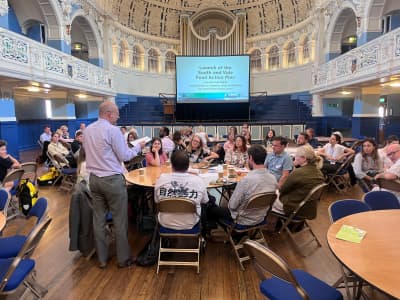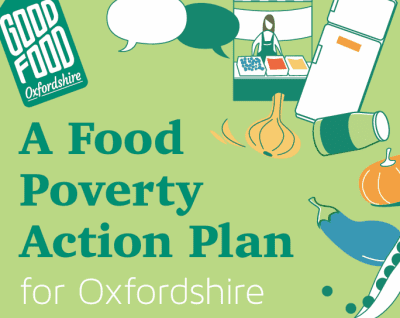A few weeks ago, Good Food Oxford had a trip to the House of Commons for the launch of Hubbub's new initiative to tackle food waste. Unfortunately, we were so overexcited that we forgot to write our own blog, so here's one from the marvellous Sustainable Food Trust to tell you all about it!

This week, Hubbub launched their Food Hub with an event around the latest thinking on cutting domestic food waste with leading politicians, companies and campaigners, including representatives from Sainsbury’s, Tesco and Birdseye.
Hubbub is a new organisation that is taking a fresh approach to communicating environmental issues by using positive messages that make it easier for people to do the right thing.
The focus of the day was on how to tackle domestic food waste, but as leading campaigner and founder of
Feedback, the umbrella organisation for the initiatives Feeding the 5000, Gleaning Network UK and The Pig Idea, Tristram Stuart, was quick to point out, in recent months there has been an unequal shift towards focusing on the waste that is produced by households, away from retailers and manufacturers.
A report by
British Retail Consortium claimed that supermarkets are responsible for just 1.3% of all UK food waste. However, this report failed to include the waste that occurs across the supply chain including on the farm, in slaughterhouses in the form of edible offal and any waste that occurs overseas as a result of imports. On the other side of the coin, household waste figures included things like banana skins, chicken bones and tea bags, not exactly items that are fit for consumption! It’s this report that Tristram took issue with in its emphasis on consumer responsibility.
Tesco is one supermarket that has taken steps in this area, as the first retailer to release its
food waste figures. Through this report, they were able to identify where waste was occurring and take steps to reduce it. For instance, they discovered that 41% of their waste came from in-store bakeries, which led to the decision being made to display less bread during quieter times – a significant move away from their constantly abundant shelves. An obvious solution you might think, but without measuring where waste occurs, it’s almost impossible to identify solutions.
Despite moving away from ‘buy one get one free’ deals towards ‘multi buy’ offers across a range of products, there is still room for improvement. On the subject of best before dates, Niki Charalampopoulou, Managing Director of Feedback pointed out that a banana does not need a best before date so why do supermarkets continue to include estimates on other fruit and vegetables?
From listening to all of the speakers, one thing was clear and that was the need for more data. Something that Peter HajiPieris from Birdseye could attest to, having worked across 16 countries in Europe he pointed out that no other country offered anything in the way of data in the same way as the UK organisation,
WRAP. Peter’s experience of working across Europe also led him to the conclusion that this is also an issue of food security, pointing to the phenomenal amount of food that is imported by the UK.

As an expert in the field of frozen food, Peter made the point that the method of preservation is crucial in tackling food waste – not that we all need to abandon fresh produce! It’s about knowing how to make the most of your freezer, which Sainsbury’s certainly utilised when they discovered that they had accidentally over ordered on their Christmas turkeys last year. They made the decision to donate 6,000 of these to local food charities prior to Christmas, while also freezing another 4,000 to be distributed at a later date.
Although many supermarkets and manufacturers are beginning to respond to pressure on this issue, the impression was that for many this hasn’t gone far enough. However, there was generally a great deal of agreement including the need for a collaborative effort in order to tackle this problem across all aspects of the supply chain, from farm to fork, which will only happen when there is more research conducted on where waste is occurring. There also needs to be less of a burden placed on households, with the supermarkets stepping forward and intervening from a position of leadership. And finally, it’s also about changing people perceptions of food waste in the language we use, for instance ‘surplus’ instead of ‘waste’ and in light of the recent interest in misshapen fruit and vegetables, Trewin Restorick of Hubbub suggested, “lovely instead of ugly!”
Photograph: Steph French
Blog: Ellie Athanasis, Sustainable Food Trust

 As an expert in the field of frozen food, Peter made the point that the method of preservation is crucial in tackling food waste – not that we all need to abandon fresh produce! It’s about knowing how to make the most of your freezer, which Sainsbury’s certainly utilised when they discovered that they had accidentally over ordered on their Christmas turkeys last year. They made the decision to donate 6,000 of these to local food charities prior to Christmas, while also freezing another 4,000 to be distributed at a later date.
Although many supermarkets and manufacturers are beginning to respond to pressure on this issue, the impression was that for many this hasn’t gone far enough. However, there was generally a great deal of agreement including the need for a collaborative effort in order to tackle this problem across all aspects of the supply chain, from farm to fork, which will only happen when there is more research conducted on where waste is occurring. There also needs to be less of a burden placed on households, with the supermarkets stepping forward and intervening from a position of leadership. And finally, it’s also about changing people perceptions of food waste in the language we use, for instance ‘surplus’ instead of ‘waste’ and in light of the recent interest in misshapen fruit and vegetables, Trewin Restorick of Hubbub suggested, “lovely instead of ugly!”
Photograph: Steph French
Blog: Ellie Athanasis, Sustainable Food Trust
As an expert in the field of frozen food, Peter made the point that the method of preservation is crucial in tackling food waste – not that we all need to abandon fresh produce! It’s about knowing how to make the most of your freezer, which Sainsbury’s certainly utilised when they discovered that they had accidentally over ordered on their Christmas turkeys last year. They made the decision to donate 6,000 of these to local food charities prior to Christmas, while also freezing another 4,000 to be distributed at a later date.
Although many supermarkets and manufacturers are beginning to respond to pressure on this issue, the impression was that for many this hasn’t gone far enough. However, there was generally a great deal of agreement including the need for a collaborative effort in order to tackle this problem across all aspects of the supply chain, from farm to fork, which will only happen when there is more research conducted on where waste is occurring. There also needs to be less of a burden placed on households, with the supermarkets stepping forward and intervening from a position of leadership. And finally, it’s also about changing people perceptions of food waste in the language we use, for instance ‘surplus’ instead of ‘waste’ and in light of the recent interest in misshapen fruit and vegetables, Trewin Restorick of Hubbub suggested, “lovely instead of ugly!”
Photograph: Steph French
Blog: Ellie Athanasis, Sustainable Food Trust



